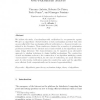350 search results - page 45 / 70 » Approximation Algorithms for Unique Games |
116
click to vote
TSMC
2008
15 years 2 months ago
2008
Learning Automata (LA) were recently shown to be valuable tools for designing Multi-Agent Reinforcement Learning algorithms. One of the principal contributions of LA theory is tha...
120
click to vote
TCOM
2010
15 years 26 days ago
2010
Abstract—This paper considers an uplink time division multiple access (TDMA) cognitive radio network where multiple cognitive radios (secondary users) attempt to access a spect...
150
click to vote
ATAL
2005
Springer
15 years 8 months ago
2005
Springer
Reinforcement learning problems are commonly tackled with temporal difference methods, which use dynamic programming and statistical sampling to estimate the long-term value of ta...
ICPR
2002
IEEE
16 years 3 months ago
2002
IEEE
This paper proposes the fractional component analysis (FCA), whose goal is to decompose the observed signal into component signals and recover their fractions. The uniqueness of o...
116
Voted
ICALP
2004
Springer
15 years 7 months ago
2004
Springer
We initiate the study of mechanisms with verification for one-parameter agents. We give an algorithmic characterization of such mechanisms and show that they are provably better ...

